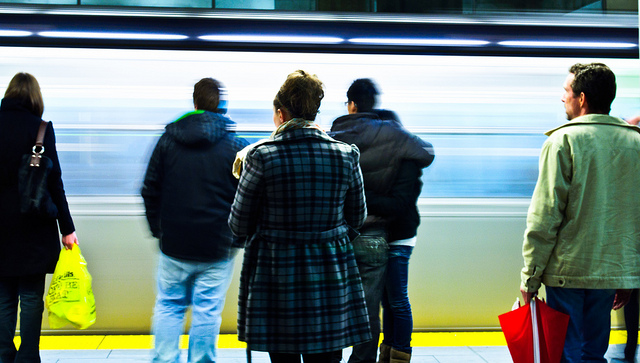In the U.S., transit funding referendums have become a fact of life. But on March 16, the first ballots will be mailed out in the Metro Vancouver transit referendum, apparently the first ever in Canada.
This could either be the start of a downward spiral for transit in Canada or the spark for a sustainable transportation movement — one that changes our communities for the better and greatly reduces our dependence on oil from the tar sands and fracking fields.
The Vancouver transit referendum was triggered by Liberal Premier Christy Clark who promised a multi-billion dollar freeway expansion (the Massey Tunnel Replacement project), and no transit funding increase without a referendum, during her election campaign. This continues the B.C. Liberal Party’s policy of starving transit while expanding urban freeways.
Premier Clark has set up a battle of national importance, and the outcome is far from certain despite the ‘No’ side being far ahead in the polls.
In Vancouver, the pro-transit ‘Yes’ side coalition had to be built from scratch. There was no coordinated effort to promote sustainable transportation to speak of before the referendum. There is now a substantial Yes side coalition including labour, environment and business groups, but it is an ad-hoc effort that will likely dissolve as soon as the ballots are counted.
The transit plan Metro Vancouver voters will get to decide on is not perfect by any means. It was assembled by the regions’ mayors on the rushed schedule imposed by Premier Clark, which left no opportunity for public input. It also includes considerable financial resources for the ‘Major Road Network’; funds that will likely be used to make roads wider, increasing oil consumption and carbon pollution.
However, these same funds can be used for bus rapid transit, protected cycling lanes and other measures to reduce oil consumption. A ‘Yes’ vote is only a first step; continued mobilization will be needed to get the kind of changes we need.
The source of funding is also far from perfect. The 0.5 per cent sales tax increase would be regressive, with lower-income households paying more as a share of their income.
However, as the Canadian Centre for Policy Alternatives notes, since the revenue goes mainly to transit improvements which benefit lower-income people “the proposal is likely progressive overall.” The bigger the proportion spent on transit, and the less spent on roadway expansion, the more progressive the overall effect will be.
The organized No side in Vancouver got off to a much faster start than the Yes side, and was greatly assisted by Premier Clark’s bizarre claim that the regions’ mayors control the TransLink board — Vancouver’s transit system’s governing board.
The fact that the elected TransLink board was replaced with an unaccountable appointed board by the previous B.C. Liberal government under Premier Gordon Campbell is greatly assisting the No side. But Premier Clark is so far refusing to consider an elected TransLink board with public meetings.
The recent decision to ‘pay two CEOs at the same time’ by sidelining the TransLink CEO and paying a temporary replacement $35,000 a month was widely denounced as an example of waste and incompetence at TransLink. However, the decision was likely made at Premier Clark’s cabinet table.
Despite Clark’s claim that she will vote Yes, she should be seen as the de-facto leader of the No side.
The overt No side in the referendum is led by the Canadian Taxpayers Federation (CTF). The CTF does not reveal their funding sources. But given their policies it seems reasonable to assume that, like U.S. anti-transit groups, oil interests pay a significant part of their expenses.
The CTF campaigns actively against climate action. In a 2010 interview with the Halifax Media Coop the CTF’s then Federal Director Kevin Gaudet, said “we don’t believe there’s such thing as man-made climate change.”
In B.C. the CTF headed by Jordan Bateman tried to kill B.C.‘s carbon tax rather than improving it by using the revenue to fund transit and passenger rail.
Another important player in the CTF’s No side campaign is Hamish Marshall, creator of the pro-tar sands EthicalOil.org website.
If the Yes side goes down to defeat in Metro Vancouver, and progressive forces run away with their tails between their legs, imposing designed-to-fail transit referendums could become a favoured tactic of right wing governments across Canada.
On the other hand, if the transit referendum results in an effective movement for better transit right wing governments will see the danger of providing such organizing opportunities. A Yes vote and a strong and ongoing pro-transit movement in Metro Vancouver would probably make this made-to-fail referendum the last of its kind.
Big Oil has a clear vision. It involves more freeways to more automobile dependant suburbs with horrible transit service, forcing even lower income families to own multiple cars and purchase large quantities of gasoline. This model, exported to multiple countries, complements big oil’s plans for more and expanded pipelines combined with hugely expanded extraction of tar sands bitumen.
Mobilizing for sustainable and socially just transportation is exactly what is needed to counter Big Oil’s plans. It would complement the unprecedented combination of widespread grassroots resistance to pipeline expansion and a growing movement for divestment from fossil fuel companies.
The lack of focus on the demand end of the tar sands pipelines is holding the Canadian climate justice movement back. And as the Pacific terminus of the proposed Kinder Morgan tar sands pipeline expansion project, what happens with climate solutions in Metro Vancouver has strategic importance for the whole continent.
The Metro Vancouver transit referendum should be seen as part of a much bigger fight, the conflict between wealthy fossil fuel interests, and everyone who wants a planet that can continue to support societies worth living in.
Ballots will be mailed out to registered voters in Metro Vancouver starting March 16, but residents can register and request a ballot up until early May.
Eric Doherty is Tanker Free BC‘s Transportation Campaigner. Find him on Twitter @Eric_Doherty
Photo: flickr/ colink.



